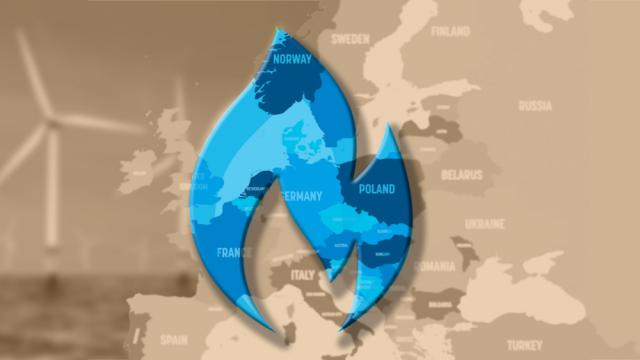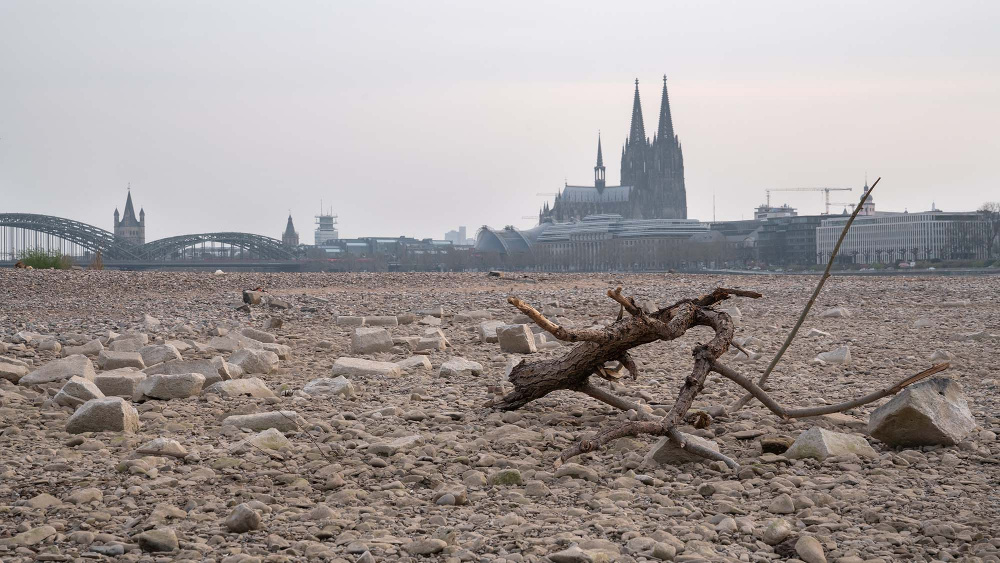
Europe has not given up on wind power and other renewables, but securing natural gas became a priority when Russia cut off its supply. (Source: Hart Energy photo illustration; Pyty, Incomible, ssuaphotos/Shutterstock.com)
Russia’s cutoff of natural gas to western Europe forced governments there to became very pragmatic, very quickly, experts concluded at the recent Annual Energy Summit hosted by Baker Botts law firm and Rice University’s Baker Institute for Public Policy.
“[Germany], in essence, wiped away all of their regulatory structures in order to allow [fossil fuel] projects to move at a rapid pace,” said Dan Brouillette, president of Sempra Infrastructure and former U.S. Secretary of Energy. “I applaud that. I think it’s important that we do that, just given the acuteness of the situation that we face today as a world.”
While the start of the European energy crisis is commonly tied to Russia’s Feb. 24 invasion of Ukraine, the continent was in crisis before that, said Marc Merrill, president and CEO of Uniper North America, a division of German electric utility Uniper SE.
“The debates around whether gas is good or bad, or whether this technology is good or bad, or this fuel source is good or bad, I personally think needs to be set aside for a moment in time.”—Dan Brouillette, Sempra Infrastructure
Energy policies that mandated a rapid move away from fossil fuels toward renewable sources were put on hold.
Germany was forced to restart mothballed coal plants to generate power, and its decision to continue to use nuclear power was presented with its own challenge because the European drought has severely limited the water supply necessary to cool the plants. Immediately, though, the country—indeed, the entire EU—rushed to fill natural gas storage ahead of winter.

“The German government came up with a very ambitious requirement to get those storage filling levels up to 95%. We’re going to meet that,” Merrill said. “And that’s going to be essential for this winter. Let’s see about next winter because I think we’re all realizing that next winter is going to be just as critical as this winter.”
An unacceptable source
But it’s not simply a short-term pivot in energy strategy, not when the supplier of 40% of European natural gas suddenly decides to not supply it.
“Seven months ago, we were thinking about how to incorporate Russian energy in Europe, in particular,” said Anna Mikulska, fellow in Energy Studies at the Baker Institute, who specializes in the geopolitics of natural gas in the EU, Russia and the former Soviet bloc. “Now, we’re thinking how to replace it completely, and that’s a huge change that will not happen from one day to another. And that will actually cause a lot of pain, both in terms of ability to heat your house at an affordable rate, but also going forward in economic terms.”
Natural gas has long been heralded as a fuel that easily fit into the “three A” paradigm: availability, affordability and accessibility. Mikulska added “acceptability” as a fourth.
“The German government came up with a very ambitious requirement to get those storage filling levels up to 95%. We’re going to meet that. ... Let’s see about next winter because I think we’re all realizing that next winter is going to be just as critical as this winter.”—Marc Merrill, Uniper SE
In western Europe, acceptability applied to renewables and other sources of clean energy. Natural gas from Russia was only acceptable because fossil fuels were on their way out, anyway.
Eastern European countries like Poland and Ukraine had an entirely different take. Natural gas could not be acceptable if it was provided by Russia because the Russians had already shown a penchant for cutting off the supply when it suited their political interests. Russian gas may have been needed, Mikulska said, but not necessarily wanted.
The European gas equation illustrates the risk of relying strictly on government policies and not on markets to ensure sufficient energy supplies.
“We know that markets are not predictable, necessarily, but we know how they work,” Mikulska said. “They work on the basis of supply and demand, whereas if we depend on governments to set up energy flows based on their policy, we can expect anything or everything. And that predictability is decreasing, particularly if those governments are like that of Russia.”
An imperfect world
Even governments that don’t resemble Russia can change course quickly.
Robert Habeck, Germany’s vice-chancellor and federal minister for economic affairs and climate action, is a leader of the Alliance 90/The Greens party. Despite leading a movement fiercely dedicated to fighting climate change, he has spent much of this year working to secure sources of energy for his country, even if they are fossil fuels.
“The pragmatism with which he acted over the last six months is very commendable,” Merrill said. “We’ve been flying around sourcing LNG, those coal plants are back on, the decision to extend the life of the nuclear plants. I think that is the kind of thing that we need going forward at all levels, particularly here in the United States.”
“We should see more focus, more investment into the decarbonization technologies like CCUS, like others, that would take a much longer time to develop in places that are not as well developed.”—Anna Mikulska, Baker Institute for Public Policy
In Brouillette’s mind, the popular approach to the energy transition as a bridge ignores the realities of an imperfect world. Renewables are not yet scaled up and the world still needs fossil fuels. The trouble is, natural gas is not flowing on either Nord Stream 1 or Nord Stream 2.
“What are we going to do to replace that gas in Europe?” he asked. “The debates around whether gas is good or bad, or whether this technology is good or bad, or this fuel source is good or bad, I personally think needs to be set aside for a moment in time. And we need to understand that the needs of the population, the needs of the citizens around the world must come first.”
Mikulska appreciates the pragmatism of European countries that intended to move away from fossil fuels but are now compelled to invest in them again. But that doesn’t mean the world needs to make a full return to the former energy structure.
“We should see more focus, more investment into the decarbonization technologies like CCUS (carbon capture, utilization and sequestration), like others, that would take a much longer time to develop in places that are not as well developed,” she said. “Like places in Asia that will continue, as we know, to use fossil fuels for decades to come.”
Recommended Reading
Chevron Pushing Longer Laterals in Argentina’s Vaca Muerta Shale
2024-09-13 - Chevron Corp., already drilling nearly 2.8-mile laterals at its Loma Campana Field in Argentina, wants to drill even longer horizontals, an executive told Hart Energy.
Now, the Uinta: Drillers are Taking Utah’s Oily Stacked Pay Horizontal, at Last
2024-10-04 - Recently unconstrained by new rail capacity, operators are now putting laterals into the oily, western side of this long-producing basin that comes with little associated gas and little water, making it compete with the Permian Basin.
Matador May Tap Its Haynesville ‘Gas Bank’ if Prices Stabilize
2024-10-24 - The operator holds 8,900 net Haynesville Shale acres and 14,800 net Cotton Valley acres in northwestern Louisiana, all HBP, that it would drill if gas prices stabilize—or divest for the right price.
E&P Highlights: Aug. 26, 2024
2024-08-26 - Here’s a roundup of the latest E&P headlines, with Ovintiv considering selling its Uinta assets and drilling operations beginning at the Anchois project offshore Morocco.
How Chevron’s Anchor Took on the ‘Elephant’ in the GoM’s Deepwater
2024-08-22 - First oil at Chevron's deepwater Anchor project is a major technological milestone in a wider industry effort to tap giant, ultra-high-pressure, high-temperature reservoirs in the Gulf of Mexico.
Comments
Add new comment
This conversation is moderated according to Hart Energy community rules. Please read the rules before joining the discussion. If you’re experiencing any technical problems, please contact our customer care team.






